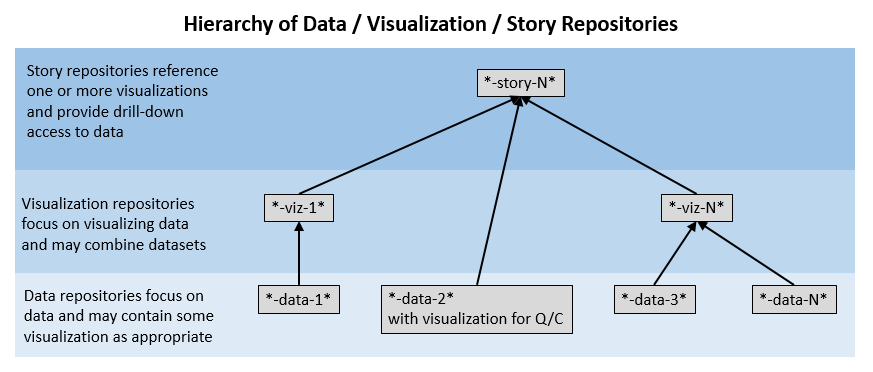About the Open Water Foundation
The Open Water Foundation (OWF) is a nonprofit social enterprise that focuses on open source software and open data to make better decisions about water resources. Water is a public resource and we believe that data and software tools should also be public (while also allowing for commercial solutions to be created that leverage open solutions). See:
- Open Water Foundation website for more information about OWF
- Open Water Foundation GitHub repositories
OWF tries to make its work public via GitHub and other cloud resources.
Repository Naming Conventions
Most OWF GitHub repositories follow a naming convention that helps keep repositories organized, using a dash-delimited repository names that may include:
- Owner/Steward/System
- First part of the repository name indicates the owner/steward or system encompassing the work.
- For example,
owfindicates a product owned by or attributed to OWF. - For example,
cdssindicates a product that is part of Colorado’s Decision Support Systems (CDSS).
- Data/Visualizations/Stories
dataindicates a dataset, for example maintained in Excel and exported to other forms such as comma-separated value (CSV) and GeoJSON files.vizindicates a visualization, typically a stand-alone website that can be viewed locally with a Python http server, and can be published as a static website.storyindicates a story.
- Model/analysis
modelindicates a model.
- Project
projindicates project files, for example when a static website is used to coordinate a project.
- Software
libindicates a library.appindicates an desktop application.webappindicates a web application.wsindicates web service.utilindicates utility.java,python,fortran,js, etc. indicate the primary programming language.
- Documentation
learnindicates training/learning resources.doc-devindicates developer documentation.doc-userindicates user documentation.websiteindicates a website.
Grouping Repositories for Products
Some repositories are intended to be used together, in which case the leading part of the repository names will often be consistent. For example:
owf-app-geoprocessor-python- main software code repositoryowf-app-geoprocessor-python-test- functional testsowf-app-geoprocessor-python-doc-user- user documentation
To coordinate product development, OWF typically recommends using a folder structure that represents organization / product / git-repos / repositories…, for example:
C:\Users\user\ User files.
owf-dev\ Work for an organization/system.
GeoProcessor\ Product.
git-repos\ Folder for repositories.
owf-app-geoprocessor-python Each repository...
owf-app-geoprocessor-python-test
owf-app-geoprocessor-python-doc-user
The above allows tools such as scripts in one repository to reference other repositories using ../ notation.
Consequently, the grouped repositories are transportable between entities.
Hierarchy of Data / Visualization / Story Repositories
Repositories that are related to data and information may be related as shown in the following diagram.

In this case, the goal is to separate concerns related to data, visualization, and stories so that the specific product in the hierarchy can be independently maintained and can be layered as needed. For example, the following situations may occur:
- Repository contains relatively simple dataset that is versioned in Excel.
- Repository contains simple dataset that is versioned in Excel and also includes basic visualization to
understand context of data and quality control.
- The visualization is mainly used in local files when the dataset is being reviewed for quality.
- Repository contains a visualization of a separate dataset, with expectation that the visualization
could be used similarly for other datasets.
- The visualization and data are published/deployed on a website.
- Repository contains a visualization that requires integrating multiple datasets, which are each
maintained in separate repositories.
- The visualization and data are published/deployed on a website (or multiple websites).
- Repository contains a story that leverages one or more datasets and one or more visualizations.
- The story can link to local computer resources for development, and may refer to published visualizations and datasets so that the deployed story has working links.
To accomplish the above, local computer repositories may be organized as in the previous section, and a simple Python (or other suitable) web server is run to view a visualization or story locally before publishing to the web.